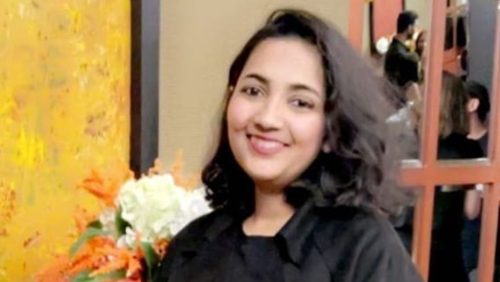
Highlighting Rare Diseases for Underserved Communities: Mohua Chakraborty Choudhury
School and Major: Bloomberg School of Public Health, Masters of Public Health, Health Systems and Policy Concentration
Graduation Date: 22 May 2024
Clubs or Organizations: Policy Fellow at Indian Institute of Science, India; Honorary Associate at Institute of Public Health, India; Member WHO Global Collaborative Network for Rare Diseases
Are there any unique or special projects you were working on during MPH?
- Well-Being Interventions for Minority Healthcare Workers. PI: Dr. Albert Wu, Dr. Mansoor Malik
- Building Trust through Shared Decision-making among African American Men with Prostate Cancer. PI: Dr. Andrew Anderson
Why did you decided to pursue MPH and why did you choose JHU?
After earning a Ph.D. in Molecular Biology and Bioinformatics, I spent six years in health policy research, focusing on rare diseases. Interactions with affected families fuelled my passion for improving public health policies for this population. Recognizing the need for specialized training, I pursued an MPH at Johns Hopkins University, known for its global influence on health policy. My time at Johns Hopkins provided me with a comprehensive, global perspective on health policy, equipping me with the knowledge and skills necessary to effect meaningful change in the lives of rare disease patients and their families.
Having now completed my MPH, I am better positioned to leverage my combined expertise in molecular biology, bioinformatics, and public health policy to address the complex challenges facing rare disease patients. Now back at the DST Centre for Policy Research at the Indian Institute of Science, (where I worked before my MPH). I’m applying my broadened perspective to address rare diseases from a public health standpoint. My goal is to bridge scientific research and policy implementation, working towards better healthcare solutions for this underserved population in India.
What skills did you learn at Hopkins that will be of value your whole life?
I took Health Systems and Policy concentration and completed two certificates: Global Digital Health and Global Health. However, the most valuable aspect I acquired was the broader, global perspective on public health. The program provided comprehensive insights into diverse health systems and policies, taught by experienced educators with international field experience. Interactions with a diverse student body further enriched my understanding, equipping me with a well-rounded view of global health challenges and solutions.
What unique experiences or achievements have shaped your educational journey so far?
My educational journey has been influenced by my hands-on experiences with rare disease patients, revealing the critical importance of equitable healthcare. Working closely with patient organizations, I witnessed firsthand the challenges faced by individuals and their families in accessing treatment and high-cost drugs. This drove my passion for public health, particularly in addressing disparities that transcend both socioeconomic divisions and disease barriers.
My commitment led me to the European Union Visitors Program in March 2023, where I explored collaborative health initiatives across different countries. The experience exposed me to the EU’s dedication to achieving the highest health security standards for its citizens. Motivated by this, I’ve successfully facilitated collaborations between stakeholders of the EU Joint Program for Rare Diseases and the Indian Council of Medical Research. Ongoing dialogues are shaping initiatives to enhance rare disease management in India, incorporating lessons from international best practices observed during my EUVP participation.
Are there any professors that have made a lasting impact on you?
Every faculty member at Hopkins has brought unique value and experiences to my learning journey, shaping my understanding of public health. However, if I were to highlight individuals who have made an indelible impact, it would be Prof. Gilbert M. Burnhamand and Dr. Sara Bennett. Prof. Burnham’s extensive field experience in emergency preparedness and response, especially in vulnerable populations, has inspired my perception of the pivotal role of public health workers. Dr. Bennett’s work addressing institutional challenges in promoting health governance, using mixed-methods approaches, has provided invaluable insights. Their teachings, coupled with the collective wisdom of the entire faculty, have enriched my educational experience at Hopkins.
Now that you’ve graduated, what are your next steps?
Following my graduation, I found myself at a crossroads – try to pursue a lucrative career leveraging my new MPH degree or follow my heart back to the rare disease ecosystem in India. But honestly, the decision wasn’t that difficult. I’ve always been drawn to paths that ignite my passion, even if they’re more challenging. I strongly believe in putting resources and intent where they’re truly needed, not just for the sake of it. And rare diseases in India? They desperately need attention. This field is critically underserved, which is exactly why I pursued this MPH in the first place! Sure, opportunities are limited. I’ll likely have to carve my own niche and blaze new trails. But that’s what excites me. I’m driven by the chance to make a real difference where it’s most needed.
How would you sum up your experience at Johns Hopkins University?
A transformative humbling experience. The fast paced year came packed with lessons in public health and life in general. Initially expecting to return as a proud graduate of the world’s top public health school, I instead found myself more humble and aware of my place in the global context. Interactions with diverse peers from around the world left a lasting impact, broadening my perspective and of global health challenges. This experience fundamentally changed my outlook, emphasizing the complexity and interconnectedness of global public health issues.